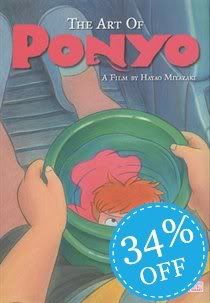
Miyazaki, you mad genius, you’ve done it again! I saw Ponyo recently and was utterly charmed by it, so much so that I feel more “in tune” with Ghibli than normal. I enjoy their movies, of course, but few have really stayed with me once I’ve finished viewing them.
In the case of Ponyo, I appreciated the novelty of making a story about a world-threatening natural disaster into a very low-key and character-driven tale, making weighty matters sweetly light. Take for example Ponyo’s various quests and desires. Although hers is a tale of breaking free of a restrained life to find a new one, there is no malevolent force or antagonist at work. Her father Fujimoto is, despite his issues with humans, merely overprotective rather than wicked. Yet Ponyo’s story is no less powerful for all of that. This sort of theme really speaks to me, which is why I found a particular joy in Ponyo.
Likewise, the dreadful floods and tsunamis that come to the island take a backseat to the character interaction, so much so that your attention is more focused on the issue of love, than whether or not the world will be saved. This captures your attention for the entirety of the film, proving that a tale does not have to be about crashing bombast in order to be compelling, nor tales of disaster to be so gloomy.
However, this makes any departure that the film makes from this mood to be especially jarring. We are told at the beginning of the film that Fujimoto plans to eventually use his Water of Life and other elixirs to rid the planet of humans, reverting it to the Devonian age. The accidental release of the Water of Life is a main plot catalyst, but the entire affair has two main problems. It casts a blemish on Fujimoto’s character, painting him as the malicious creature that he is otherwise not (he is competent, but with a slightly bumbling, hysterical air), and it is not hugely relevant to the plot, either.
Or more truthfully, such an apocalyptic plan sounds very out of place in Ponyo’s milieu and the kind of character Fujimoto otherwise is, which might be why it is quickly dropped. It would be better for it not to be there at all, with Fujimoto only working to help the Earth without darker plans in mind. The obvious intention was that Ponyo’s adventures teach Fujimoto to give up on the quest he initially put on hold, but even so, it does not jive with the rest of the film.
Most other nitpicks can merely be attributed to the fundamental nature of the film, which is that it is a fairy tale, or at least the popular modern definition of one: something soft, simple, and with illogical, but forgivable, internal mechanics. We are not meant to question why everyone except Yoki sees Ponyo as just a “goldfish” instead of the funny little human-fish creature that her natural body is, nor how and in what way the gigantic sea goddess and the human wizard are “parents” of Ponyo and a school of similar fish-girls which are only half Ponyo’s size.
Fitting for a Ghibli film, Ponyo is gorgeous, with bright, sweet, colours and blue and golden glows. The underwater scenes are breathtaking, with the additional treat of prehistoric fish, and you must watch these scenes many times over to catch them all. The more mundane world is also captured perfectly.

No comments:
Post a Comment